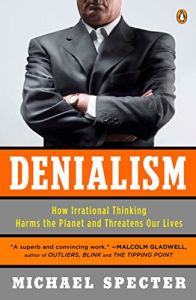Join getAbstract to access the summary!

Join getAbstract to access the summary!
Michael Specter
Denialism
How Irrational Thinking Hinders Scientific Progress, Harms the Planet, and Threatens Our Lives
Penguin Group (USA), 2010
What's inside?
Superb essays against willful antiscience, antiknowledge activism that is based on denial.
Recommendation
Michael Specter’s direct, elegant New Yorker-style prose renders the complexity of his assertions entertaining, easy to read and eminently digestible. Specter dissects many advocates’ widespread insistence on denying accepted scientific and medical facts when the truth might undermine their financial or emotional self-interest. His style makes the pages turn, except in the few places where he seems temporarily to run out of gas, and his book is full of revelations. Its episodic nature works in its favor, since you can read any chapter as a stand-alone article, with no loss of Specter’s big ideas or editorial purpose. Are you interested in the malfeasance of drug companies and how that affects your daily health? Do you buy organic foods? Do you pursue alternative medical care? Do you know how much impact genetic science may have on you? Or do you enjoy reading about the shockingly smug ignorance of others (who doesn’t enjoy that?) and how they insist on their own enlightenment? getAbstract highly recommends Specter’s astute overview of today’s bunk, and how not to subscribe to it.
Summary
About the Author
Award-winning writer Michael Specter covers technology and science for The New Yorker, where he has been a staff writer since 1998.
















Comment on this summary